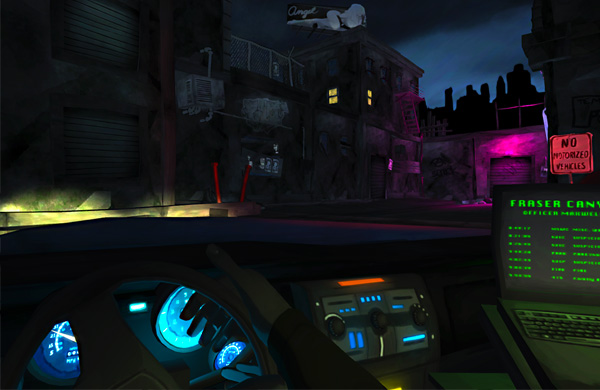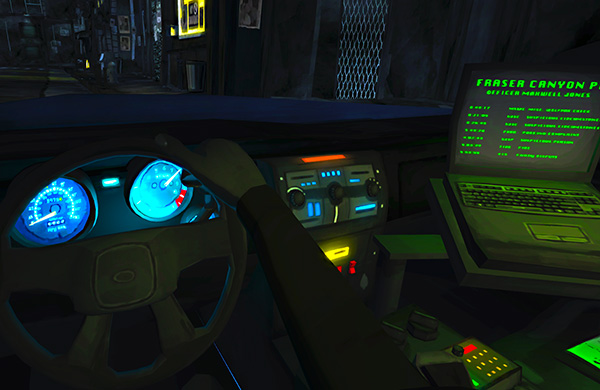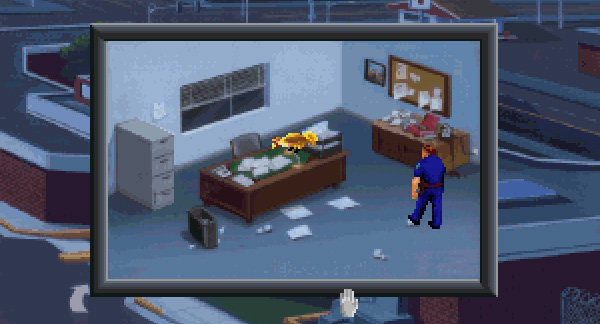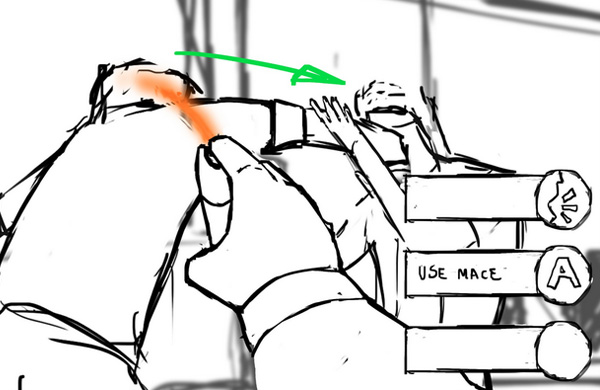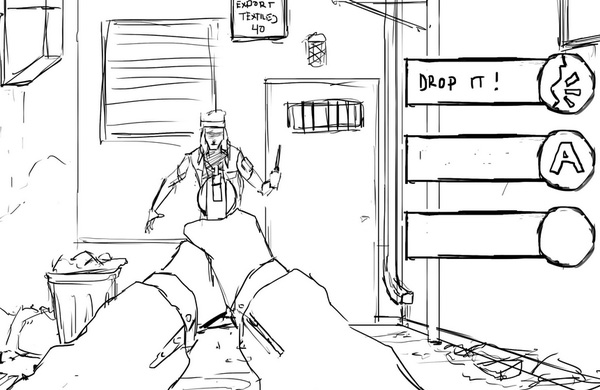Interview: Jim Walls' Arresting Development
Writings on the Walls
California Highway Patrol officer turned Police Quest designer Jim Walls is back, and he's Kickstarting a spiritual sequel, Precinct. Pausing only to have the sudden realisation that my Skype contact list now looks like a Sierra employee directory from the early 90s, I caught up with him and executive producer Robert Lindsley to ask: will it be any cop?
RPS: With most of these revival games, the obvious question is how much has the gaming industry changed since the originals. This time though, the biggie seems to be how policing has changed. In Precinct, we see a shift from relatively innocent Lytton to something closer to Sin City, and from a department where everyone pulled together to a seemingly much more corrupt system both in and around the force. Is this a reflection of how you see the world having gone, or just a more interesting game setting?
WALLS: Probably a little bit of both. The world is way more out of control than it was 20 years ago. Police officers today have way more danger that they face than they did then. What I’m trying to do is bring everything up to date, and make it as realistic as possible, just like I did with the original Police Quests. Lytton was a small city, and this is a large one. Most large cities have quite a bit of crime. In particular, there’ll be two street gangs that are taking over the central precinct area, and that’s going to be the purpose of the game - to break those gangs up. We’re still going to have the police camaraderie though, and the comedy.
LINDSLEY: I think once you take the larger city approach, like a Detroit, and decide that's going to be the setting, that necessarily makes for an experience where you're dealing with darker themes and more corruption on the force and on the bench. Being a cop is just harder now.
RPS: Harder than a classic Sierra adventure? I'm amazed anyone lasts a week.
LINDSLEY: Well, that's why we have so many cops in riot gear and stuff! Seems like they can't get through a week without something happening.
RPS: At least roads are usually less actively murderous in the real world.
LINDSLEY: Jim, do you feel like it’s harder to be a cop now than it used to be?
WALLS: Yes, I think it is. You’re scrutinised... you're under a magnifying glass everywhere you go. There’s always some kind of camera around, like a phone, and when you make a split-second decision on the street, for good or bad...
RPS: Speaking of technology, one thing that struck me from the Kickstarter video and concept art was a certain retro vibe on display - the fonts, the old computer in the car, the use of mace rather than a taser and so on - my first thought was wondering if the game was set in the 80s or similar. Is that just reading too much into things?
WALLS: I think what you see there is more or less a placeholder, to bring out a little drama.
LINDSLEY: I think it’s interesting that you talk about the 80s, because that’s one theme we want to explore, but I think ultimately the basis for the art style is trying to bring concept art to life; we want to do something really dramatic with lights, and something unique. It’s a darker environment, but you’re seeing a lot of cool stuff like the red and purple. I think you can get the 80s out of it a bit, but I’m not sure if that’s where we’re going to be going longer-term.
RPS: As far as modern policing goes - Jim, it’s been 20 years now since you were on the force and making the original Police Quests. Have your views on policework and crime-fighting shifted at all since then?
WALLS: My personal views?
RPS: Yeah. For instance, again while looking at the darker setting, I started thinking of Chester Gould's politics while writing Dick Tracy, and how it led to an increasingly right-wing take on the world and eventually him just giving up, going sci-fi and giving Tracy a Space Coupe to hang out with the Moon Maid. Unless there’s a SpaceVenture tie-in coming, I’m guessing there’s nothing that extreme on the way, but I was wondering if your outlook had changed any with either age or distance.
WALLS: I don’t think so. If you were a cop in the 40s, 50s, 70s, it’s the same today, with different equipment. Operating procedures may change a bit, but philosophically I don’t think there’s any difference other than that it's more dangerous. I’m 20 years older, my skin’s sagging a little bit, but as long as the brain doesn’t stop functioning, you think the same way.
RPS: Does the amount of time you've now been retired from the force make it easier to do potentially controversial design, with no chance of treading on toes, need to worry about presenting the police in a good light and so on?
WALLS: Oh, I don’t worry about that. I don’t think I worried about that back then.
RPS: The name of the game, Precinct, immediately makes me think of my favourite bits in the original series - that sense of informed whimsy, where Sonny was hanging out with people, off-duty and so on and things could get a little lighter than when he was laying down the law. One thing that disappointed me though was that almost the whole cast got thrown out after each game - will this one let us get to know them better?
WALLS: It’s a good question. Each Precinct game is going to stand alone, with the same main character, Maxwell Jones, but each precinct’s going to have its own cast. There could be some transferred over, but each time you’re going to meet new people. As each game comes out, it’ll expand this world, and you’ll see characters when you go back to your old precincts.
RPS: Ah, okay. Have you decided exactly what Maxwell is going to be at the start of the series - beat cop, homicide detective, highway patrol?
WALLS: He’s going to be a beat cop - a rookie, on foot. There’ll be four square blocks that are his beat, with a partner.
RPS: Part of the fun of Police Quest was that much of it was based on real stories - silly ones like the Gremlin (a prankster who torments Sonny Bonds’ sergeant with tricks like putting a live chicken in his office), and more serious things like Jessie Bains being based on a real criminal. I’m guessing the Satanic drugs cult of Microsoft Paint users was probably fictional, but I’ve always wondered what the weirdest true story was.
WALLS: You remember the nutcase at the lake in Police Quest 3? That was a real one, and there’s still a California Highway Patrol badge at the bottom of it. I got a call about a body floating down the aqueduct, went down, and there was this big gathering of people down by the lake. I rolled the window down and asked if a body had come out, and this lady told me no, no body, but there was a crazy guy. So, just as I looked at my right, I saw this guy, completely nude, running up over the embankment towards my car. I figured if this was the guy who went down the concrete aqueduct, maybe his clothes had been ripped off of him, so I didn’t think too much of it. As he approached, I reached out and opened the trunk and I said, get in and I’ll give you a blanket… and he reached in my open window and ripped my badge right off my uniform and hurled it just as far as he could into that lake. That… pissed me off.
RPS: When making that into a puzzle, there must have been a temptation to let the player get away with beating him up and then just have the message be “Now, that’s not exactly procedure, but I’m going to let it slide just this once...”
WALLS: Well, here’s the deal. He throws it in and I’m mad, so I go down the embankment and he grabs this lady’s overcoat and fishing pole and starts wading out. Like an idiot, I’m running towards him and go right in after him with my uniform, gun belt and everything…
RPS: Heh. Now, I seem to remember that if you do that in the game, you die. And in fact, get harshly scolded for it. By you.
WALLS: I didn’t go all the way into the water! When he saw me coming, I backed out. Lights went on, and I realised that if I got close, he’d drown me! So I challenged him - said, why didn’t he come try rip the rest of my uniform off? And he came after me. Luckily, I had more adrenaline pumping and was able to arrest him. That was the incident - a little different from the game.
RPS: And here's how that scene played out in Police Quest 3...
RPS: Ah, sweet SCI. Switching to the new game, I may as well kick off with the first thing I noticed - interface-wise at least, Precinct looks... very simplistic, almost like a version of Dragon’s Lair where Dirk risks getting his balls chewed off for not reading Singe his Miranda rights. How is this style going to allow for the depth you want?
WALLS: It's going to be point and click, with hot-buttons for things like getting to your weapons. This is all placeholder stuff, we’re still in the design and development and idea stage.
LINDSLEY: When Jim and I talk about what we want to do, we think about Sierra style games and how often they were frustrating compared to modern games. We want to modernise the adventure game and merge it with what people are expecting from current gameplay experiences, so we say, let’s take what’s best from those old Police Quest games and what made that unique, but blend it with current ideas so that modern gamers can take to it really well too. I think it's a really delicate balance, and one of the best things about Kickstarter is that we can put ideas in front of the community and have this built-in focus group. Everything in that video was real-time and made in Unity - we can hand the executable out to backers and say "Take a look at this and let us what you think of this mechanic..."
RPS: Okay. I’m still not really... It seems like people who are interested in Precinct because of Police Quest will likely want a traditional point and click, which absolutely isn’t the only way to go. But I'm not seeing that legacy here, in a game that at least at first glance seems to be "Here are four options, one of them will probably be correct and the others will likely kill you." Again, I keep thinking of Dragon's Lair rather than, say, the QTE driven approach of The Walking Dead.
LINDSLEY: Yeah, I totally get what you’re saying. The idea is that we really are not building a linear experience, and if you look at something like Dragon's Lair, that's an incredibly linear experience. I think that's one of the challenges - how do you build a mission driven, somewhat open world, but with locations you interact with in those old-school point-and-click ways? You will get missions you can choose to take, be demoted if you start failing, and stuff like that. We don't want to make the game linear; we want to build consequences for your actions.
RPS: So, what’s the intended scope of the first game (of five planned) in terms of complexity? Scripted adventure content is some of the most expensive to create, and with only $500,000 to work with, I’m not seeing how we can have what sounds like a Wing Commander inspired sprawling mission structure but also the narrative depth we've seen in games like The Walking Dead and Heavy Rain.
LINDSLEY: That’s a really good point. You can’t build Heavy Rain for $500,000. So, how do you do it effectively? Our approach is to say that there’ll be different paths to take, but there’ll be points where those merge and different things happen based on the missions you’ve been doing. The game is very modular, and we’re developing the engine tech now so that we can go in and develop missions really easily and sort of place different weights on each. We’ll have for instance good cop/bad cop decisions, like a drug dealer on a corner who’ll offer to pay you a hundred bucks not to bug him for three days. Take that deal, and there’ll be repercussions.
RPS: You're going to be able to be a bad cop without being instantly struck down? Interesting. Will it be possible to actually succeed on that side of the line?
LINDSLEY: What do you think, Jim?
WALLS: I would love that. There’s just so many things you can do…
RPS: Conceptually, that’s a massive jump from Police Quest, where you can literally get away with about one thing in the whole series - letting a girl off a speeding ticket. And even then, only if you don’t go the extra step and try to take her up on her sexy bribe.
LINDSLEY: It is very different. I think part of that was that you had to be so linear back in the day. There were definitive states you had; you couldn’t go through the whole game on a totally different path. It’s much easier to do that now that we've got the 3D worlds, things can be re-used and we’ve got more flexibility.
RPS: Out of interest, why do you think we don’t see more police/detective adventures? Really, there’s Police Quest, there’s Tex Murphy, LA Noire, Laura Bow, and then a lot that claim you’re a detective when really you’re just solving puzzles rather than actually being an investigator. It seems an oddly underserved genre.
LINDSLEY: That’s a really interesting point. I hadn’t considered that, but you’re right - there’s very few. Especially with so many shows on TV that haven’t migrated into the game world.
RPS: Even when they do, like with Dexter, it’s often just stuff like glorified minigame collections rather than anything that really puts you into the show's mindset.
LINDSLEY: I wonder if it’s because designers don’t want to be limited. Maybe they want more open worlds, more ways to interact with the game. I’m kinda spitballing, but... yeah. Interesting.
RPS: Rules are definitely difficult, especially with open worlds and the expectations set by games like GTA. Even LA Noire has to essentially let you do what you want, commandeering cars and so on at will. Police Quest reveled in its restrictions, but how do you stop that tighter leash chafing after all this freedom?
LINDSLEY: My take is that you hear lots of stories on the lines of “I played Police Quest as a kid and I became a cop because of that,” and I think people really like the dynamic of having those rules. It’s really easy- hang on! No! It is not easy to create a GTA style game. But...
RPS: But you don’t have to moderate the player’s behaviour because you’ve given them carte blanche to do what they like anyway.
LINDSLEY: Exactly. That’s a very good design choice made for that world. But I think people also like having different experiences and actually have to follow the rules, like not being able to just commandeer any car.
RPS: Do you think players will choose to be good cop or bad cop though?
WALLS: I think they’ll play good cop.
LINDSLEY: It’s fun to be naughty, and a replayability factor is good. Fans of this genre and this type of game though, I think those are the people who want to be the good cops.
RPS: Thank you for your time.
Precinct is shooting for $500,000 over the next month, with the game expected in about a year's time, give or take. The complete Police Quest series is also available over on GOG.COM.


